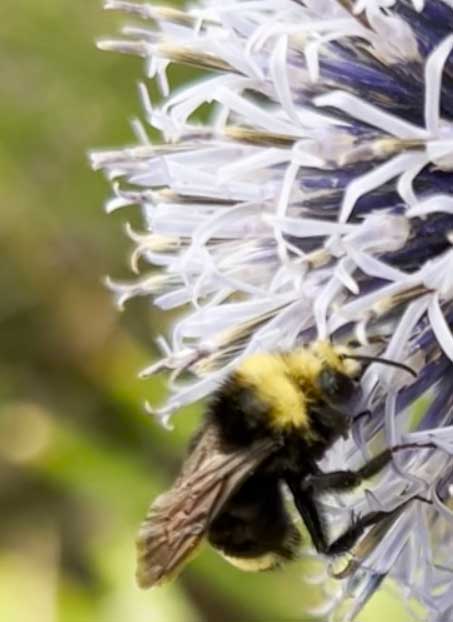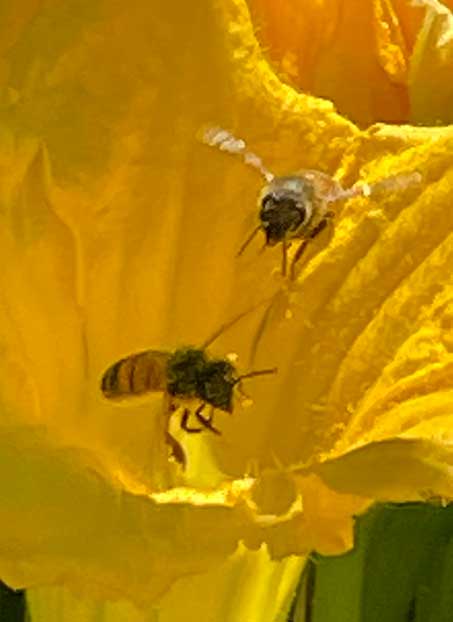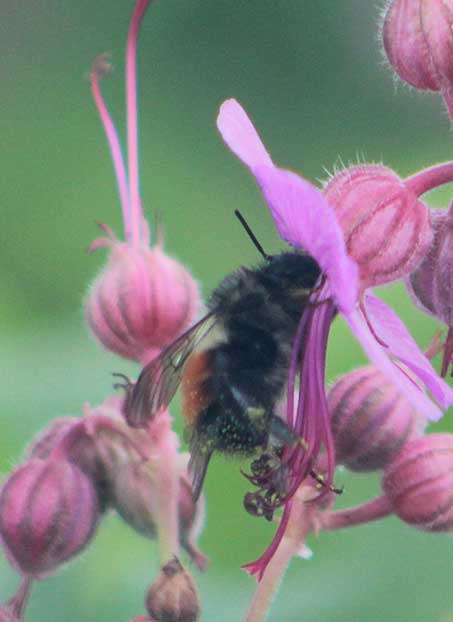Bee Campus
Clark College has been certified as a Bee Campus!
A Bee Campus USA affiliate is a college campus that includes a bee habitat. In the spring of 2023, students, staff, visitors, and, importantly, BEES, will see native flowers sprouting up in gardens across campus. These flowers and natural areas where bees can make nests and lay eggs will help Clark establish this important bee habitat.
Clark College—and other Bee Campus USA affiliates—show that the built environment (such as campuses, neighborhoods, city parks, and even roadsides) can feature a thoughtful design that allows bees to thrive in shared areas.
In April, 2023 Clark College earned certification as a Bee Campus affiliate, becoming the fifth college in Washington to earn that distinction.

Most of us think we’ve been stung by a bee. But truth be told, those of us who have been stung were probably stung by something other than a native bee.

Flowers provide bees with all the food they need. Bees use the pollen and the nectar to feed themselves.

bees on flowers tend to ignore humans and they are not aggressive. And many of them don’t even retain the capability to sting!
Notice about the Bee Gardens
Clark College’s Bee Garden flowers aren’t all natives
Our flowers started blooming in May. They are beautiful, and bees are visiting them for pollen and nectar, but the flowers are a bit of a disappointment to us. We had ordered seeds for flowers that are native to the Pacific Northwest, but when the flowers bloomed, we saw European poppies, toadflax, and other non-natives. These flowers are being used by the bees, but they aren’t ideal. The ideal flowers for native bees are those flowers that co-evolved with the bees for thousands of years. The perfect flowers for bees are those flowers that would have been in meadows in this part of the world 500 years ago! Somehow, between our ordering and our sowing, we received some native seeds but plenty of non-native seeds as well.
Here is our plan going forward
We anticipate having to re-till and re-seed our gardens periodically. In the fall of 2023, we will apply more flower seeds on top of the seeds that will naturally drop from our existing flowers. We will re-double our efforts to ensure that we purchase native flower seeds, and we’ll use these seeds to re-seed our gardens as needed. By the spring of 2024 the percent of natives will increase, and we’ll continue to prioritize native seeds for our Bee Gardens.
What should I do if I have non-native flowers at home?
What bees don’t use is lawns—so any flowers are better than the non-native grasses that we have in our yards. Some ornamental flowers are so hybridized for human enjoyment that they have lost much of the pollen and nectar benefits that bees need. Some roses, lilies and others have been bred to be pretty for humans and in so doing, they have lost some of what they historically gave to bees—pollen and nectar. On the other hand, there are plenty of flowers that people love as ornamentals, but bees use as well—sage, lilac…and European poppies! Some people have a combination of ornamental flowers plus native flowers. These yards offer plenty for humans and plenty for bees.
How can you be sure you have native flowers?
When you buy flowers look for those that are native to the Pacific Northwest. If the flowers are already blooming, identify the flower using a phone app like iNaturalist or Seek. Once you’ve found the name of the flower, look it up and find the Latin name and then the RANGE of the flower. The range will let you know if it is native to the Pacific Northwest.
Education
As a Bee Campus, Clark College is committed to offering education to students and community members about the region's native pollinators. This education might be in the form of biology labs, Community Science research contributions, environmental science service learning, Continuing Ed seminars, and Bee Units offered to nearby elementary schools.
Students in several disciplines at Clark now study a Bee Unit where they learn about our native pollinators. For example, our biology majors’ students study native bees and gather data in spring-time bee surveys.
What’s happening with the Bee Campus recently?
Tilling
We are tilling most of our Bee Gardens at Clark. Tilling will disrupt the non-native grass that will overwhelm flowers if not challenged. We plan to till three times with a two-to-four-week gap between each tilling. After three rounds of tilling, we hope the grass will be sufficiently set-back to not out-compete the new flower seeds. Grass came into the flower gardens aggressively this fall. With three rounds of tilling, we’re hoping that we won’t need to till again for two to three years.
More flower seeds
After the final tilling (probably in December 2023) we will sow flower seeds like we did last year. We won’t need to sow as many seeds because the flowers from last summer self-seeded. But tilling will drive some seeds deep into the soil, and they won’t be able to germinate, so we’ll sow some extra seeds.
Signs
Eleven informational bee signs are being erected beginning this week. Visitors will be able to read about the biology of bees, where they nest, what they eat, how many species we have and much more.
You likely won’t see bees on campus this winter, but they are safe underground
And what are the bees doing now? Most of the adult bees that flew from flower to flower last spring and summer have died, but the eggs they laid (mostly underground) have hatched and are progressing toward adulthood. They will develop into adult bees this winter but since there won’t be flowers until spring, the new adults will stay underground until the flowers bloom. So, Clark has thousands of bees on campus right now—but they are dormant underground and are waiting for the flowers of spring.
Hive
Contact
Our Bee Campus coordinator :
Steven Clark
sclark@clark.edu
Can you bee-lieve it?
Loading...
Do you have any questions about Clark’s Bee Campus?
- Any ideas?
- Are you interested in learning more about Bee Campus?
- Are you interested in learning more about native bees?
- Would you like to get involved or volunteer?
- Would you like someone to talk to your group about bees?